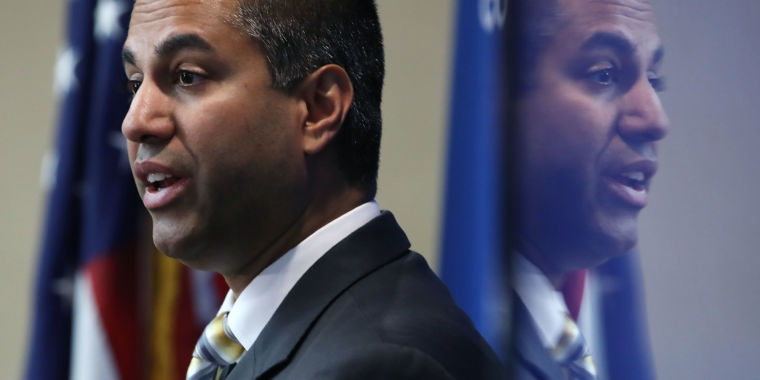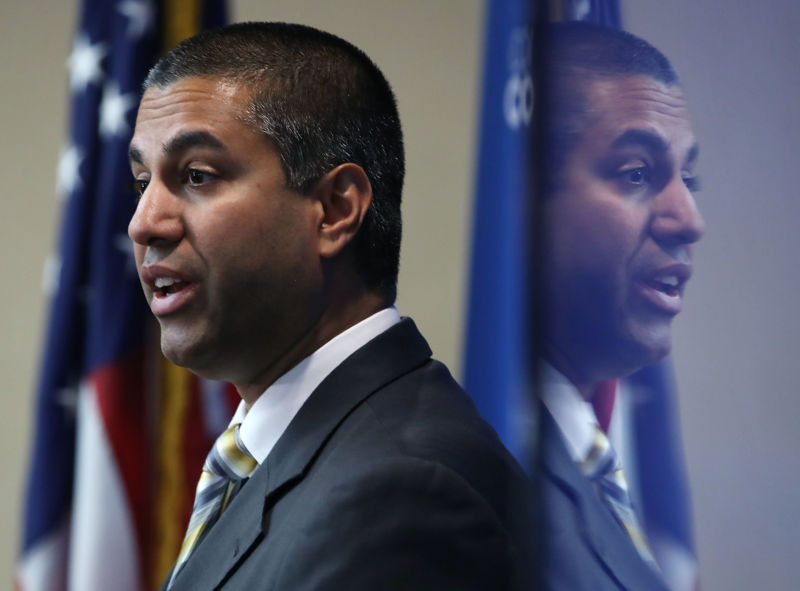

/ FCC Chairman Ajit Pai speaking at a press conference on October 1, 2018, in Washington, DC.
The Federal Communications Commission isn’t punishing carriers for their horrible response to Hurricane Michael in Florida, despite a commission investigation finding that the carriers’ mistakes prolonged outages caused by the hurricane.
Mobile carriers’ response to the hurricane was so bad that even FCC Chairman Ajit Pai—who normally avoids any criticism of the industry he’s paid to regulate—called it “completely unacceptable” in October 2018. Outages left many customers without cell service for more than a week, as Verizon and others struggled to restore service.
Pai initiated an investigation and released the FCC Public Safety Bureau’s resulting report yesterday. The report recommends changes that carriers can make to improve future hurricane responses, and Pai said he is “call[ing] on wireless phone companies, other communications providers, and power companies to quickly implement the recommendations contained in this report.”
But following the report’s recommendations is optional for the carriers because the FCC didn’t announce any plans to require them to implement the changes. The FCC investigation found that carriers failed to follow their own previous voluntary roaming commitments, unnecessarily prolonging outages, yet the FCC is still relying entirely on voluntary measures to prevent recurrences.
The FCC declined comment when contacted by Ars about the lack of punishment and new requirements. “We don’t comment on, confirm, or speculate about enforcement matters,” a spokesperson for Pai told Ars.
FCC finds lack of cooperation
“The poor level of service several days after landfall by some wireless providers cannot simply be attributed to unforeseeable circumstances specific to those providers,” the new FCC report said. “A lack of coordination and cooperation between certain wireless service providers on the one hand, and utilities and debris clearance crews on the other, unnecessarily prolonged critical backhaul repairs and full restoration of functioning wireless service. The Bureau learned of numerous cases in which a wireless provider had restored service to customers only to have that service brought down as third-party crews damaged communications assets while clearing trash or restoring power lines and utility poles. Such lack of coordination among wireless providers, utilities, and debris clearance crews unnecessarily prolonged the time customers lacked service.”
In October, longtime telecom attorney and consumer advocate Harold Feld pointed out that Pai had eliminated Obama-era consumer-protection rules that were meant to prevent long outages or discontinuations of service after disasters such as Hurricane Michael.
“It’s déjà vu all over again—the same lack of coordination problems we saw in both the Katrina Report and the Sandy proceeding,” Feld, the senior VP of advocacy group Public Knowledge, told Ars today in response to the FCC report. “We have been hammering on this for years, particularly as part of the tech transition [from copper to wireless or fiber networks]. But it keeps getting ignored in favor of voluntary measures and promises from the carriers to totally get it right this time.”
“At a minimum, we need public oversight of disaster planning to make sure it happens,” Feld also said. “We need to stop having reports that show the same problems recurring time and again and actually do something to make sure the problems don’t happen in the first place.”
Advocacy group Free Press said it’s still waiting for the FCC to conduct a similar investigation into carriers’ response to Hurricane Maria, which hit Puerto Rico in September 2017.
“The FCC’s Hurricane Michael report serves another painful reminder to Puerto Ricans of the FCC’s inexcusable failure to conduct a comprehensive investigation into the collapse of communication networks on the islands following Hurricane Maria,” Free Press Senior Director Joseph Torres told Ars. The FCC needs to “scrap its voluntary framework on how the carriers should respond to a disaster, conduct a comprehensive investigation on the vulnerability of our communications networks, and adopt enforceable regulations that ensure the telecom companies take action to quickly restore service.”
The report also shows that carriers have “a credibility problem” and that the FCC must require them to build more resilient networks, Torres said. (Pai’s FCC did provide funding for restoration efforts in Puerto Rico and the Virgin Islands.)
Key problems and recommendations
With Hurricane Michael, the FCC’s Public Safety Bureau said it found that “three key factors—insufficiently resilient backhaul connectivity, inadequate reciprocal roaming arrangements, and lack of coordination between wireless service providers, power crews, and municipalities—were the predominant causes of the unacceptable lack of service.”
As we previously noted, the report says that carriers failed to follow their own voluntary commitments:
The Bureau further concludes that a lack of coordination and cooperation among wireless providers themselves (exacerbated by inadequate roaming arrangements) inhibited their ability to increase service availability via roaming. Some providers appear not to have comported with the Wireless Resiliency Cooperative Framework, the voluntary commitment that several nationwide service providers proposed and committed to abide by in 2016. Specifically, it appears that some wireless providers demurred from seeking assistance from potential roaming partners and, therefore, remained inoperable.
The failure to comply with voluntary commitments meant that “[a]t least tens of thousands wireless customers had to wait days, unnecessarily, for their mobile phone service to be restored while their provider held off entering into roaming arrangements,” the FCC said.
While some carriers effectively used roaming to restore service, “[o]ther providers appeared to believe their own network would weather the storm and they would not need comprehensive pre-storm roaming agreements in place,” the FCC said.
Florida’s own deregulation hurt as well, Feld said. “In theory, coordination between the power companies and the telecommunications providers should be done by the state Public Service Commission, which in theory regulated both,” he told Ars. “Florida, however, has been particularly aggressive in deregulating telecom. As a result, there is no one in charge to make sure these two essential services work with each other.”
Among other things, the FCC report recommended that wireless carriers “establish clauses in their commercial roaming agreements in hurricane-prone areas that would enable activation of roaming prior to a storm’s landfall.”
The FCC also recommended that carriers increase coordination with utilities and debris removal teams to prevent fiber cuts and other problems during restoration efforts. The report further said that carriers should “use diverse backhaul options, such as microwave links and satellite links, in hurricane-prone areas.”
FCC Democrats weigh in
The FCC held an open meeting yesterday and could have voted on whether to approve the report as written, which would have directed more public attention to the issue. Instead, the FCC released it directly from the Public Safety Bureau without a vote of commissioners.
“This should have been a meeting item, highlighting the very serious weakness in our national communications infrastructure, and with pledges by the chairman to open proceedings to take up the report’s recommendations,” Feld said. “That is what [then-FCC Chairman] Kevin Martin did after Katrina. Especially in light of how much noise Chairman Pai made about the failure of carriers to respond at the time all this occurred, you would think that Pai would make a major big deal about this and take swift action to make sure it didn’t happen again.”
The FCC’s two Democratic commissioners issued mild calls for action when contacted by Ars.
“This report finds that [carriers] fell short of their own commitments when Hurricane Michael slammed into the Florida Panhandle, and we saw significant communications challenges in Puerto Rico after Hurricanes Irma and Maria made landfall,” Commissioner Geoffrey Starks said. “We need to do better to meet our charge of ensuring that our networks are operated to promote the safety of life and property.”
Commissioner Jessica Rosenworcel said the FCC “need[s] to assess what policy changes are needed to ensure that our networks are better prepared for the disasters that may come our way in the future.”









